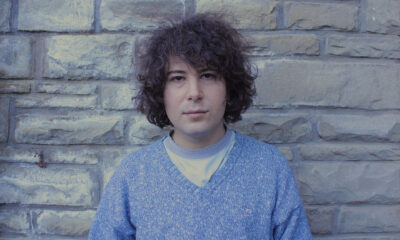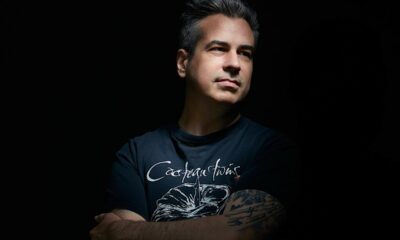Reviews
Adaptation. (#083)
“100 Films for 100 Rainy Days”

To begin. To begin. How to start this essay? I’m hungry. I should get a coffee. Coffee would help me think. Maybe I should write something first, then reward myself with coffee. Coffee and a muffin. So I need to decide what to focus on for this review. Maybe a banana nut. That’s a good muffin….
Directed by: Spike Jonze » Written by: Charlie and Donald Kaufman » Based on the Book by: Susan Orlean, 2002 » Region/Time: U.S.A., 114 minutes
Starring: Nicolas Cage as Charlie Kaufman/Donald Kaufman » Meryl Streep as Susan Orlean » Chris Cooper as John Laroche » Brian Cox as Robert McKee » Cara Seymour as Amelia Kavan » Tilda Swinton as Valerie Thomas » Maggie Gyllenhaal as Caroline Cunningham.

“The script I’m starting, it’s about flowers. No one’s ever done a movie about flowers before. So there are no guidelines…” – Charlie Kaufman
“What about ‘Flowers for Algernon’?” – Donald Kaufman
“Well, that’s not about flowers. And it’s not a movie.” – Charlie Kaufman
“Ok, I’m sorry, I never saw it.” – Donald Kaufman
Charlie Kaufman, a real-life screenwriter, has written a number of screenplays and choosing one film to appear on this list was difficult. I choose Adaptation over the excellent Being John Malkovitch because the movie affected me to a greater extent, often hitting uncomfortably close to home, whereas Malkovitch was more of a sustained joke with dark overtones. I also think that Spike Jonze is one of the greatest directors currently working and has unfortunately stalled before creating his third movie, the much overdue Where the Wild Things Are, although his videos, such as The Beastie Boys’ Sabotage are well known.
Adaptation is ostensibly an adaptation of Susan Orlean’s loose biography of John Laroche, The Orchid Thief. The book itself is not so much a linear biography as a collection of observations on the nature of life and expectations. This must have seemed like a worthwhile challenge to Charlie Kaufman who was concurrently writing Confessions of a Dangerous Mind and Eternal Sunshine of the Spotless Mind. At some point, however, his script became a document of the struggle it takes to adapt a book for the big screen, and Kaufman incorporated not only Susan Orlean, but himself and an imaginary twin into the screenplay. As a result, the movie blossoms to not only discuss orchids and John Laroche, but also evolution, screenwriting, Hollywood clichés, depression, passion, collectors, twins, self-confidence, as well as ultimately trying to answer the question “What is Life about?” That is a lot to cram into a movie about flowers. And that’s not even including the ridiculous amount of masturbation, both literal and figurative.

Although the movie may sound fantastic, it is full of carefully observed moments that are true to life. The scene in which Charlie drops his date off at her house, and then fails to kiss her, is followed by these excruciating familiar moments: [Charlie’s voice over] I should have gone in. I’m such a chicken. I should have kissed her. I should go knock on her door and just kiss her. It would be romantic. It would be something we’d tell our kids about someday. I’m going to do that right now. [drives away]
Early on in the film, at his meeting with the executive, Valerie, Charlie outlines what his vision of the final film will be: “I don’t want to cram in sex or guns or car chases or characters learning profound life lessons or growing or coming to like each other or overcoming obstacles to succeed in the end. The book isn’t like that, and life isn’t like that, it just isn’t. I feel very strongly about this.” Of course, instead of the film conforming to this vision, Charlie’s own understanding of what “real life” is like evolves, and the final movie includes all these facets.

In the final third of the movie, real-life script guru Robert McKee appears (played here by the original Hannibal Lecter, Brian Cox) and shoots down Charlie’s insulated and pedestrian view of life with a profanity-laden speech: “Nothing happens in the world? Are you out of your fucking mind? People are murdered every day. There’s genocide, war, corruption. Every fucking day, somewhere in the world, somebody sacrifices his life to save someone else. Every fucking day, someone, somewhere makes a conscious decision to destroy someone else. People find love, people lose it. For Christ’s sake, a child watches her mother beaten to death on the steps of a church. Someone goes hungry. Somebody else betrays his best friend for a woman. If you can’t find that stuff in life, then you, my friend, don’t know crap about life. And why the FUCK are you wasting my two precious hours with your movie? I don’t have any use for it. I don’t have any bloody use for it.”
Amen. After this point in the film, the script begins to tie together loose ends, and we learn all is not as it originally appeared. This final third can be taken as tongue-in-cheek, perhaps written by Charlie’s fictional twin brother, Donald, but I think it is intended to be both in on the joke as well as full of actual commentary on life. In an early draft of the script, these final scenes are filled with many more action movie beats, including one that made me laugh out loud. The twins escape in a boat which subsequently explodes and Donald uses a propeller blade to machete a rampaging alligator.

Spike Jonze also bring a lot to the movie that is easy to overlook. His subdued style never intrudes, even when he must depict the entire history of life on earth within a sixty second montage. Notice, in particular, the visceral horror the two car accidents in the movie. Not even the car crash in Grindhouse gave me such a feeling of shock and disorientation as these did.
The movie ends on an upbeat note, with Charlie finally admitting his love for his brother and taking the initiative in his life for once, as well as finally knowing how to finish his script: “I know how to finish the script now. It ends with Kaufman driving home after his lunch with Amelia, thinking he knows how to finish the script. Shit, that’s voice-over. McKee would not approve. How else can I show his thoughts? I don’t know. Oh, who cares what McKee says? It feels right. Conclusive. I wonder who’s gonna play me. Someone not too fat. I liked that Gerard Depardieu, but can he not do the accent? Anyway, it’s done. And that’s something. So: ‘Kaufman drives off from his encounter with Amelia, filled for the first time with hope.’ I like this. This is good.”

Up Next in the Film Canon: The Great Escape.
-

 Culture6 days ago
Culture6 days agoCirque Du Soleil OVO Takes Leeds Fans on a Unique, Unforgettable Journey [Photos]
-

 Hardcore/Punk5 days ago
Hardcore/Punk5 days agoHastings Beat Punks Kid Kapichi Vent Their Frustrations at Leeds Beckett University [Photos]
-

 Alternative/Rock4 days ago
Alternative/Rock4 days agoA Rejuvenated Dream State are ‘Still Dreaming’ as They Bounce Into Manchester YES [Photos]
-

 Indie6 days ago
Indie6 days agoMichele Ducci Premieres Bouncy New Single “You Lay the Path by Walking on it”
-

 Alternative/Rock7 days ago
Alternative/Rock7 days agoWilliam Edward Thompson Premieres His Stripped-Down “Sleep Test” Music Video
-

 Country1 week ago
Country1 week agoJayce Turley Reflects on “Misery” with the Premiere of His New Single
-

 Hardcore/Punk6 days ago
Hardcore/Punk6 days agoSpiders from Uranus Premieres Their Debut Album ‘Blow It Out!’
-

 Dance/Electronic2 weeks ago
Dance/Electronic2 weeks agoPerfect Female Type Premieres Synthwave Single “Science of Love”




